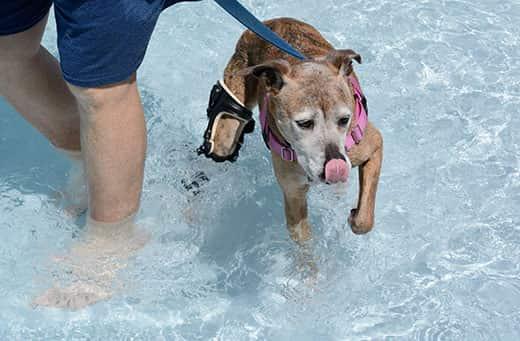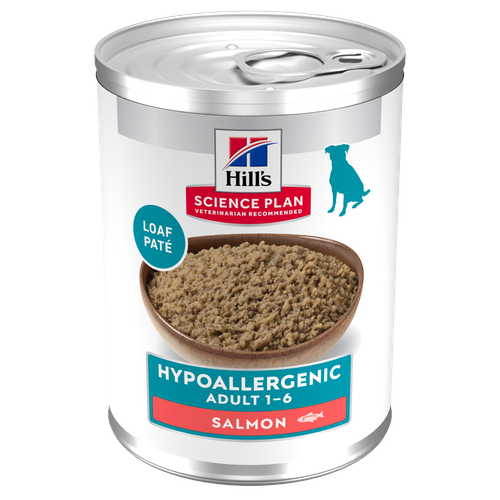
-
Find the right food for your petTake this quiz to see which food may be the best for your furry friend.Find the right food for your petTake this quiz to see which food may be the best for your furry friend.Featured products
 Adult Wet Dog Food with Beef
Adult Wet Dog Food with BeefHill's Science Plan Adult Multipack Wet Dog Food with Chicken, Beef & Turkey are complete premium pet foods for adult dogs from 1 year. Your dog will love these deliciously smooth and savoury minced loaves, formulated for balanced nutrition and overall health.
Shop Now Puppy Food
Puppy FoodHill's Science Plan Puppy Multipack Wet Dog Food with Chicken & Beef are complete premium pet foods for growing puppies from weaning until 1 year old and for pregnant and nursing dogs. Your puppy will love these deliciously smooth and savoury minced loaves, formulated for balanced nutrition and overall health.
Shop Now Mature Adult Dog Food
Mature Adult Dog FoodHill's Science Plan Mature Adult Multipack Wet Dog Food with Chicken & Beef are complete premium pet foods for mature adult dogs from 7 years. Your dog will love these deliciously smooth and savoury minced loaves, formulated to deliver the appropriate amount of energy to support the needs of adult dogs.
Shop NowFeatured products Mature Adult Wet Cat Food with Chicken
Mature Adult Wet Cat Food with Chicken
Tender chicken chunks in gravy for mature adult cats. Made with easy-to-digest ingredients, high-quality protein for lean muscle maintenance and antioxidant vitamins C+E for optimal health.
Shop Now Adult Multipack Wet Cat Food with Beef, Ocean Fish & Chicken
Adult Multipack Wet Cat Food with Beef, Ocean Fish & ChickenTender chunks in gravy for cats, with high-quality protein to maintain lean muscle. With vitamin E and omega-3s & -6s for healthy skin and balanced minerals to support healthy vital organs.
Shop Now Light Adult Multipack Wet Cat Food with Chicken & Ocean Fish
Light Adult Multipack Wet Cat Food with Chicken & Ocean FishTender chicken chunks in gravy for cats, with L-carnitine and fewer calories for ideal weight management. Packed with high-quality protein, omega-6s, and vitamin E for shiny fur and healthy skin.
Shop Now -
Dog
- Dog Tips & Articles
-
Health Category
- Weight
- Food & Environmental Sensitivities
- Urinary
- Digestive
- Joint
- Kidney
-
Life Stage
- Puppy Nutrition
- Adult Nutrition
- Senior Nutrition
Cat- Cat Tips & Articles
-
Health Category
- Weight
- Skin & Food Sensitivities
- Urinary
- Digestive
- Kidney
-
Life Stage
- Kitten Nutrition
- Adult Nutrition
Featured articles The Incredible Science Behind Your Pet's Microbiome
The Incredible Science Behind Your Pet's MicrobiomeLearn what your pet's microbiome is, how it contributes to your pet's gut and overall health, and why nutrition is important in maintaining healthy microbiomes.
Read More The Right Diet For Your Pet
The Right Diet For Your PetIn people, the right diet is very important. If you are eating the wrong way for your metabolism, activity level, age and lifestyle you could end up with health issues.
Read More Show some love with wet foods: a great choice for pets with health issues
Show some love with wet foods: a great choice for pets with health issuesShow some love with wet foods: a great choice for pets with health issues.
Read More -


No matter how big they get, we like to think of our dogs as eternal puppies who will be with us forever. As much as you may wish to deny that your dog is getting older, it's important to keep an eye out for senior dog health conditions so that you can help improve his quality of life. Keep reading to learn about common health problems in senior dogs that might one day affect your pet.
When Is a Dog Considered Senior?

Generally, a dog is considered senior when they reach seven years of age, says the Dogs Trust, although it really depends on the size and breed of the dog. Very large breeds age more rapidly than small breeds. While a Great Dane would be considered a senior by age six, a tiny Chihuahua may not reach that status until eight or nine years of age. Of course, other factors, such as environmental conditions, can affect how an individual dog ages. Once your dog starts showing signs of age-related health issues, they can be considered a senior dog regardless of their true age.
Here are eight common health problems in senior dogs.
1. Hearing and Vision Loss
Older dogs may have deteriorating eyesight and hearing, says the RSPCA. Senior dogs are also prone to developing cataracts, which the PDSA defines as an abnormal cloudiness of the eye, caused by changes in lens structure, that can lead to partial or total blindness. Even without surgery to remove the cataracts, dogs can still manage to get around well due to their good sense of smell and excellent hearing. A number of issues from genetics to chronic ear infections can cause hearing loss and deafness. While deaf dogs may not be able to hear you talking, they will be able to feel vibrations on the floor when you approach. You can also use hand signals to communicate with them. Always take precautions when you are outside with a dog who can not hear or see well. You don’t want them wandering away and getting into trouble!
2. Joint Problems
Osteoarthritis is a very common cause of joint pain and stiffness in dogs, says the PDSA. This is a progressive degenerative disease that causes loss of lubrication and the wearing away of cartilage in the joints. Although there is no cure, there are a number of treatments that can help reduce pain and slow the progression of this disease. Nutrition, especially omega-3 fatty acids, plays a strong role in supporting dogs with joint issues. Ask your veterinarian about foods available to support joint health and if a dietetic food would be beneficial for your dog.
3. Dementia/Cognitive Dysfunction
Like people, dogs can lose cognitive function as they age, resulting in symptoms similar to those of senility or Alzheimer's in humans, says the Kennel Club UK. Confusion and disorientation, whining or barking for no apparent reason, appearing to get lost in familiar surroundings, and bathroom accidents can all be signs of cognitive dysfunction. These symptoms can also indicate other conditions, so it's best to talk to your veterinarian if you notice these behaviours in your dog. Like osteoarthritis, there is no cure for dementia, but it can often be helped with certain medications and antioxidant-enriched foods.
4. Cancer
Older dogs are prone to getting lumps and bumps, and luckily, not all of them are malignant. But age increases the risk of cancer in dogs, so it's best to get any strange lumps checked out, says the Kennel Club UK. Regular checkups and cancer screenings can help catch tumours that aren't easily seen or felt.


Tasty Tips
5. Heart Problems
Heart disease can also develop as dogs age. According to the PDSA, the most common heart diseases found in dogs include mitral valve disease, cardiomyopathy (disease of the cardiac muscle) and arrhythmia (irregular heartbeat). Heart disease can lead to congestive heart failure, which occurs when the heart isn't able to pump blood efficiently and fluid backs up in the heart, lungs and chest cavity. Coughing, difficulty breathing, exercise intolerance, loss of consciousness and unexplained vomiting are all signs of possible heart disease and should be checked out by a vet right away.

6. Obesity
As dogs age, it is common for them to lose weight due to muscle loss. However, some older dogs may still be at risk of weight gain and obesity. This can have a significant impact on their health, especially as they age and become less active. The Kennel Club UK warns that dogs carrying excess weight are more prone to conditions like diabetes, high blood pressure, heart disease and kidney disease. In addition to providing as much exercise as your older dog can safely tolerate, it's important to feed your dog age-appropriate meals to make sure they are getting the right balance of nutrition, as well as the correct amount of daily calories.
7. Gastrointestinal Issues and Incontinence
A number of problems can cause gastrointestinal (GI) issues in your ageing dog. While not always serious, GI problems can point to issues such as kidney disease, so if vomiting or diarrhoea doesn't clear up quickly, it's best to talk to your vet. Also, older dogs sometimes have urinary accidents as the muscles controlling the bladder weaken. Incontinence could be a sign of a bigger problem like a urinary tract infection or possible dementia. If these issues are not a one-time occurence, it's best to talk to your vet.
8. Kidney Issues
Ageing kidneys tend to lose their function as dogs get older. While chronic kidney disease is progressive and can't be cured, notes Blue Cross, it can be managed with proper treatment, prolonging your dog's life and improving their quality of life. Routine blood tests for your senior pet can catch kidney disease in the early stages and improve your dog's chances. If you have any concerns about what you're feeding your older dog, be sure to consult your veterinarian.
Getting older is as hard on your senior dog as it is on you. One of the best things you can do for your ageing dog is to take them for regular wellness checks every six months to screen for these common health problems. Keeping an eye on them at home and reporting any unusual behaviours to your vet can also help catch these illnesses early, improving your dog's chance of a long and healthy life. They may not be a puppy anymore, but they will always be your dog!


Jean Marie Bauhaus is a pet parent, pet blogger, and novelist from Tulsa, Oklahoma, where she usually writes under the supervision of a lapful of fur babies.
Related products

Hill's Science Plan Puppy Multipack Wet Dog Food with Chicken & Beef are complete premium pet foods for growing puppies from weaning until 1 year old and for pregnant and nursing dogs. Your puppy will love these deliciously smooth and savoury minced loaves, formulated for balanced nutrition and overall health.

Hill's Science Plan Mature Adult Multipack Wet Dog Food with Chicken & Beef are complete premium pet foods for mature adult dogs from 7 years. Your dog will love these deliciously smooth and savoury minced loaves, formulated to deliver the appropriate amount of energy to support the needs of adult dogs.

Hill's Science Plan Hypoallergenic Adult Wet Dog Food with Salmon is a complete premium pet food for all adult dogs from 1 year. This savoury tinned loaf is specially formulated for dogs with delicate skin and stomachs. It features a single novel animal protein source and is grain-free.

Hill's Science Plan Adult Multipack Wet Dog Food with Chicken, Beef & Turkey are complete premium pet foods for adult dogs from 1 year. Your dog will love these deliciously smooth and savoury minced loaves, formulated for balanced nutrition and overall health.
Related articles

Learn effective tips for feeding a dog that's a picky eater and ensure proper nutrition for a finicky eater. Discover tips for pet parents at Hill's Pet UK.

Learn about the potential health risks of a raw diet for dogs and why they aren't the best option for your pup or you.

Many human foods are dangerous to dogs. Read about 5 of the worst toxic food offenders that can kill your dog - and how much it takes to hurt them.

How, when and what to feed your new puppy is an important decision, learn more about the things to consider for feeding your puppy.

Put your dog on a diet without them knowing
Our low calorie formula helps you control your dog's weight. It's packed with high-quality protein for building lean muscles, and made with purposeful ingredients for a flavourful, nutritious meal. Clinically proven antioxidants, Vitamin C+E, help promote a healthy immune system.
Put your dog on a diet without them knowing
Our low calorie formula helps you control your dog's weight. It's packed with high-quality protein for building lean muscles, and made with purposeful ingredients for a flavourful, nutritious meal. Clinically proven antioxidants, Vitamin C+E, help promote a healthy immune system.

